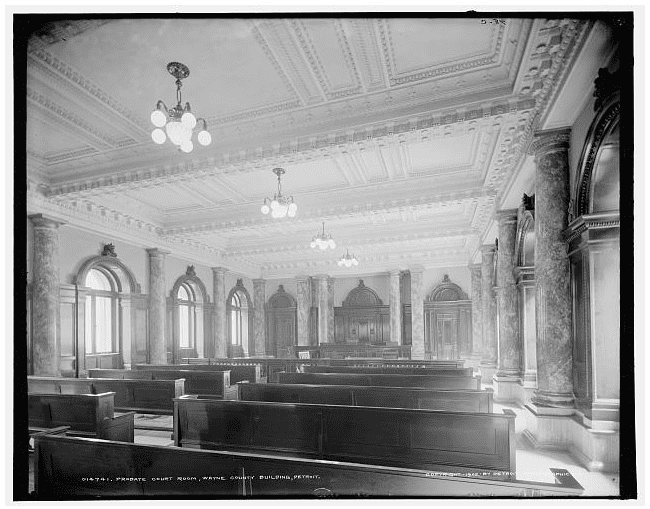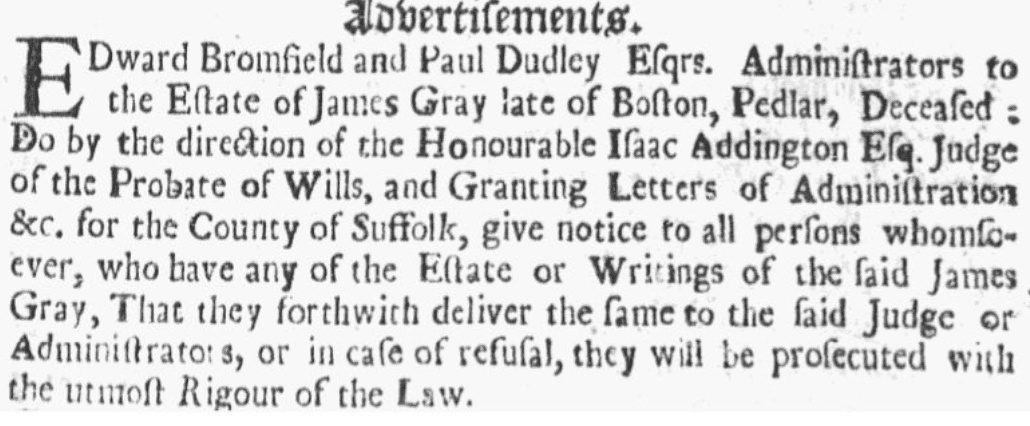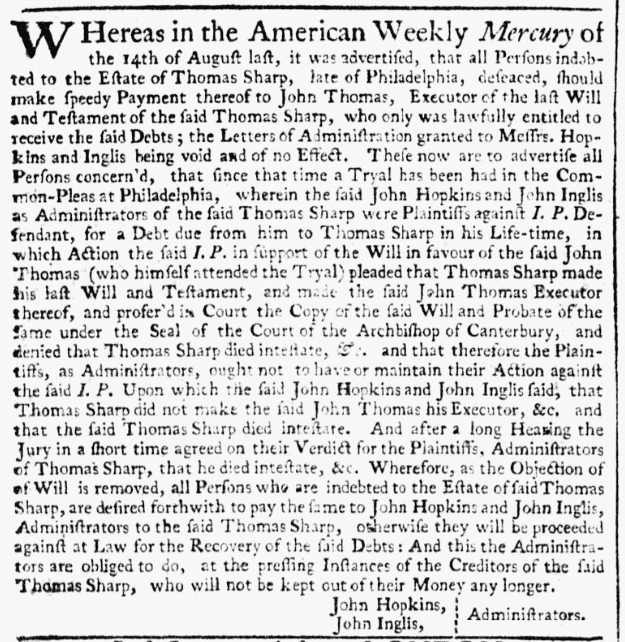Introduction: In this article, Mary Harrell-Sesniak writes about a source of family history information found in old newspapers that is very helpful to genealogists: probate notices. Mary is a genealogist, author and editor with a strong technology background.
Ah, the naivete of genealogists who assume all records and articles have been designed for family historians!
This is so often wrong – and I would venture to say that there is almost no record, save a family history book, Bible record, or handmade document such as a sampler or fraktur, that is created just for us. Most records are created for legal reasons using terms that vary for specific legal reasons. This is especially true of the variety of terms used in the matter of probate administration.

Note: Luckily, this is not the case for birth, marriage and death (BMD) notices, which are tagged in appropriate ways in GenealogyBank’s Historical Newspaper Archives. It doesn’t matter if the article mentions birth, death, dying or passed away – or married or nuptials – your newspaper query will most likely find it.
Probate records can be enormously helpful to genealogists. But with the variety of terms used, how can family historians find these helpful records? This article will explore how we as researchers should approach a probate search.
Start with the Obvious
The rule of thumb for smart searching is to start with the main term you are searching for. However, when the search is for a will, that query will produce many unwanted results such as this example – so switch to a related term such as probate.

By searching for probate, I found a 1705 advertisement for the estate of James Gray late of Boston, pedlar (peddler) – and for the record, although it’s not the earliest probate record in America, it is the earliest mention I found in GenealogyBank.

Try Associated Terms
Once you have located a record, search again with associated terms – as the term “probate” may not be in every newspaper article about estates. Such was the case with this article about Thomas Sharp, merchant of Philadelphia, whose probate began in 1739.

Notice that this article uses the terms “indebted,” “debts,” “demands,” “estate” and “administrators” – along with the first hint that the wrong representatives were trying to collect debts owed to the estate. This newspaper advertisement leads us to believe there were administrators who were impostors.
Don’t Assume You Found the Only Record – Keep Looking
Following up on this case, we find more advertisements nearly ten months later about the estate of Thomas Sharp – including some alleging that Hopkins and Inglis were still trying to collect Sharp’s debts even though they were not authorized to do so. Letters of Administration (another important search term) had been granted to Hopkins and Inglis, but they were considered invalid. John Thomas, “Executor of the last Will and Testament of the said Thomas Sharp,” made sure to report his exact residence because he wanted to collect payments for debts owed to Sharp. He lived at the house of Jonathan Zane on Second Street in Philadelphia.

Court Cases
As with many disagreements, the story of Thomas Sharp’s estate shenanigans continued – when Hopkins and Inglis vs. Thomas came to trial.

Hopkins and Inglis argued that Thomas Sharp had died intestate. The judge agreed and administration was again granted to them. As this lengthy advertisement noted, “the Creditors of the said Thomas Sharp… will not be kept out of their Money any longer.”
Spelling Variations Then and Now
The above newspaper articles illustrate how and why you should follow up a probate case – but they also illustrate the importance of using alternate spellings for terms such as tryal (trial) and pedlar (peddler). Remember to vary your query until you have exhausted the possibilities.
As we all know: where there is a will, you’ll usually find genealogists varying their query!
Probate Terms
Findmypast has a Glossary of Probate Terms which you may find useful:
https://www.findmypast.com/articles/glossary-of-probate-terms
Related Article:
